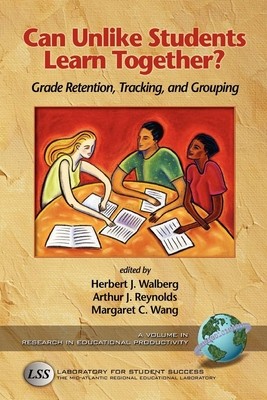
- We will send in 10–14 business days.
- Publisher: Information Age Publishing
- Year: 2004
- ISBN-10: 1593111142
- ISBN-13: 9781593111144
- Format: 15.6 x 23.4 x 1.2 cm, softcover
- Language: English
- SAVE -10% with code: EXTRA
Can Unlike Students Learn Together? (e-book) (used book) | bookbook.eu
Reviews
Description
For the first time, this book brings together three controversial topics: homogeneous grouping of students within classrooms by ability or achievement criteria, tracking of students into courses of study by the same criteria, and retention of students in their present grade so that they repeat a year's work instead of being promoted. The editors solicited syntheses of research on these topics from outstanding scholars with a variety of views. Initial versions of the chapters were discussed at a national invitational conference sponsored by the Laboratory for Student Success, the Mid-Atlantic Regional Educational Laboratory, at Temple University Center for Research in Human Development and Education (CRHDE) through a contract with the former Office of Educational Research and Improvement (OERI), now the Institute of Education Sciences (IES) of the U.S. Department of Education. At the conference, the chapter authors benefited from discussions with one another, other scholars, policymakers, educators, and parents. Their recommendations are reported in the last chapter.
EXTRA 10 % discount with code: EXTRA
The promotion ends in 20d.19:54:08
The discount code is valid when purchasing from 10 €. Discounts do not stack.
- Publisher: Information Age Publishing
- Year: 2004
- ISBN-10: 1593111142
- ISBN-13: 9781593111144
- Format: 15.6 x 23.4 x 1.2 cm, softcover
- Language: English English
For the first time, this book brings together three controversial topics: homogeneous grouping of students within classrooms by ability or achievement criteria, tracking of students into courses of study by the same criteria, and retention of students in their present grade so that they repeat a year's work instead of being promoted. The editors solicited syntheses of research on these topics from outstanding scholars with a variety of views. Initial versions of the chapters were discussed at a national invitational conference sponsored by the Laboratory for Student Success, the Mid-Atlantic Regional Educational Laboratory, at Temple University Center for Research in Human Development and Education (CRHDE) through a contract with the former Office of Educational Research and Improvement (OERI), now the Institute of Education Sciences (IES) of the U.S. Department of Education. At the conference, the chapter authors benefited from discussions with one another, other scholars, policymakers, educators, and parents. Their recommendations are reported in the last chapter.


Reviews